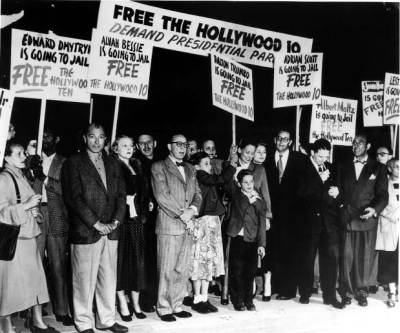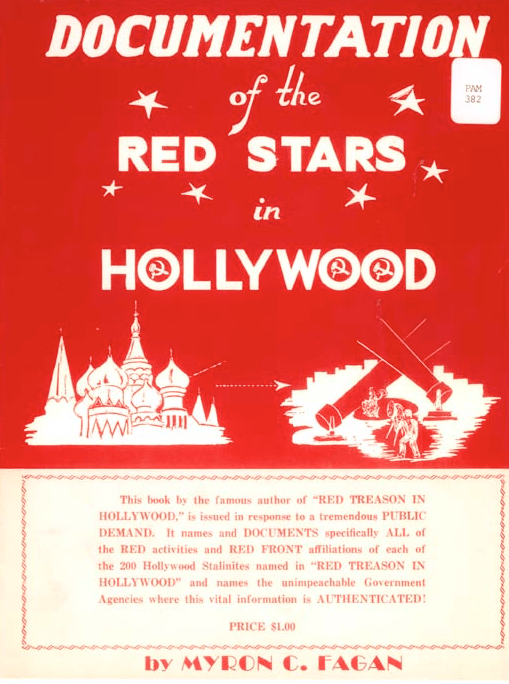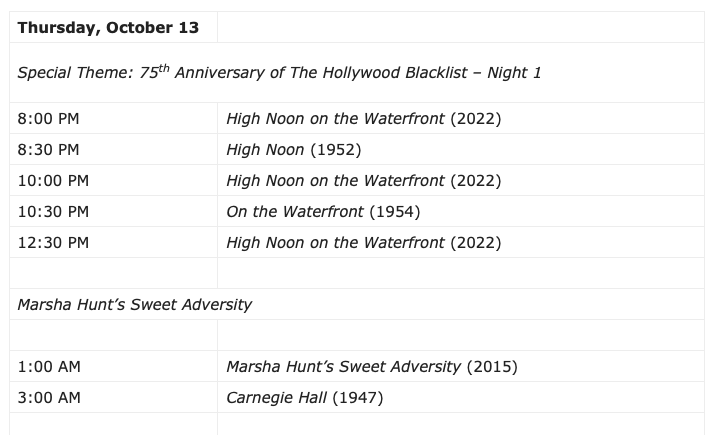75th Anniversary of the Hollywood Blacklist Takes on Added Significance With Escalation of New Cold War

All Global Research articles can be read in 51 languages by activating the Translate Website button below the author’s name.
To receive Global Research’s Daily Newsletter (selected articles), click here.
Follow us on Instagram and Twitter and subscribe to our Telegram Channel. Feel free to repost and share widely Global Research articles.
***
Let’s Hope History Does Not Repeat
This month marks the 75th anniversary of the start of the Hollywood Blacklist. On October 27, 1947, screenwriter John Howard Lawson, the first member of what came to be known as the “Hollywood Ten,” testified before the House Committee on Un-American Activities (HUAC).
The contentious, testy testimony before a gavel-banging congressman in Washington launched the Hollywood Blacklist, in which members of the motion picture industry who refused to “cooperate” with HUAC by informing on themselves and others about their leftist politics were forbidden from working in the movies until roughly 1960.
This was when the Hollywood Ten’s Dalton Trumbo received screen credits under his real name (instead of a pseudonym) for writing Spartacus (1960) and Exodus (1960).
The Hollywood Ten served prison time and were fined for refusing to answer questions such as “Are you now or have you ever been a member of the Communist Party?” and for declining to rat out others.
This conservative cancel culture, enforced by the movie studios and the U.S. government with the aid of the FBI, prevented about 300 talents from being able to earn a living in the cinema—because of their politics and beliefs.

Photo courtesy of Ed Rampell
The inquisition in Tinseltown in turn paved the way for the larger repressive Red Scare of McCarthyism during the 1950s, which decimated the American left and fostered the rightward shift in American politics away from the New Deal.

Reds-under-the-beds zealotry of the Blacklist period. [Source: oscars.org]
Commemorations of the 75th anniversary of the Hollywood Blacklist kick off on October 13, 2022, as Turner Classic Movies launched a film series with the premiere of the excellent short, High Noon on the Waterfront. This compelling 14-minute documentary co-written/co-directed by David C. Roberts and Billy Shebar shows how two artists ensnared in the Blacklist metaphorically expressed their stands regarding the motion picture purge through their films.
Elia Kazan, the quintessential informer who collaborated with HUAC and “named names” of other suspected radicals, directed On the Waterfront (1954), a movie that justified informing.

Source: wikipedia.org
Carl Foreman, who was blacklisted and eventually moved overseas in order to be able to continue making movies, wrote the allegorical Western High Noon (1952), with the frontier town of Hadleyville—where Gary Cooper is forsaken by the townsfolk and must take a stand against evil by himself—symbolizing Hollywood during the Blacklist.

Source: wikipedia.org
Using the actual written words of the talents, Kazan is voiced by John Turturro, while Ed Norton speaks Foreman’s lines. The short creatively intercuts between scenes of High Noon and On the Waterfront. Here is the TCM schedule:
On October 21 a movie about the production of the Orson Welles-directed 1936 play that came to be known as Voodoo Macbeth opens. In it, Texas Congressman Martin Dies, who co-started what came to be HUAC, is depicted as race-baiting and red-baiting Voodoo Macbeth’s all-Black cast and its crew. About 11 years later, the congressional committee Dies set into motion turned from the stage and set its sights on the screen. The film Voodoo Macbeth is being theatrically released October 21. For more information, see voodoomacbethfim.com.
L.A.’s new Academy Museum, dedicated to film culture and history, is also reportedly planning a Blacklist series in Spring 2023. Oona Chaplin—whose grandfather Charlie directed and starred in 1957’s anti-HUAC A King in New York—is presenting a BBC podcast on the Blacklist in 2023.

Members of the Hollywood community who formed the Committee for the First Amendment flew from L.A. to Washington during the 1947 HUAC hearings to support and defend the Hollywood Ten. At the bottom of the airstair is actress Marsha Hunt, a civil libertarian who was blacklisted even though she was never a Communist Party member. Marsha died in September 2022 at age 104 and is chronicled in the documentary TCM is airing, Marsha Hunt’s Sweet Adversity, on October 13. [Source: Photo courtesy of Ed Rampell]
As book banning, media blacklisting and school board prohibitions on teaching history accelerate, and as a new cold war with Russia is being launched, it is important for Americans to remember when the First Amendment was forgotten in Hollywood.
Stay tuned—and down with censorship!
*
Note to readers: Please click the share buttons above. Follow us on Instagram and Twitter and subscribe to our Telegram Channel. Feel free to repost and share widely Global Research articles.
Ed Rampell is an L.A.-based film historian and critic who also reviews culture, foreign affairs and current events. Ed can be reached at [email protected].
Featured image: A demonstration to free the Hollywood Ten along with members of the Ten and their supporters. [Source: indiewire.com]



